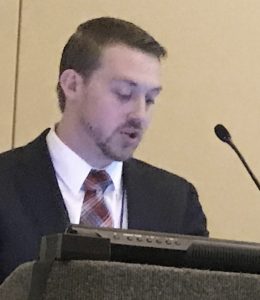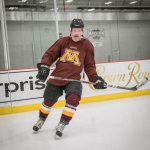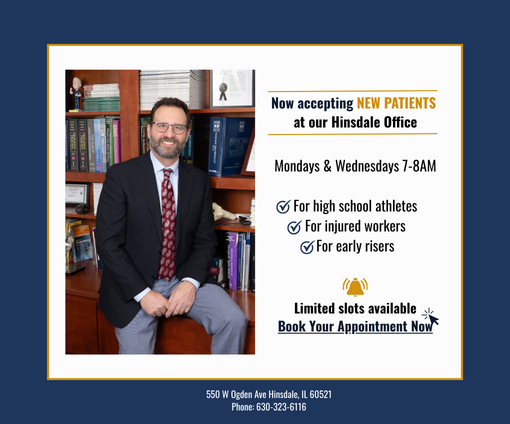OTRF research presented on definitive FCE to determine safe return to sport following ACL reconstruction

Dr. Chris Larsen presents outcome research on OTRF’s functional capacity evaluation for athletes returning to sport following an anterior cruciate ligament reconstruction during the Mid-American Orthopaedics Association’s annual meeting.
Dr. Chris Larsen, a Loyola University Chicago Stritch School of Medicine graduate and former honors research student in OTRF’s SOAR (Students interested in Orthopaedics and Research) program, delivered the podium presentation. According to Dr. Larsen, the presentation was well received and generated considerable interest from the orthopaedic surgeons in attendance.
“I was honored to deliver the good news about the effectiveness and validity of Dr. Chudik’s FCE,” Dr. Larsen said. “I’ve had the opportunity to work with Dr. Chudik on several projects while in medical school. It is very rewarding to know our FCE will be a valuable tool for orthopaedic physicians and physical therapists. Before Dr. Chudik and OTRF developed the ACL FCE, there was not a definitive and validated assessment test to determine safe return to sport,” Dr. Larsen added.
“Despite all the advances in ACL reconstruction and improved outcomes, there always has been a tremendous amount of variability in the criteria used by physicians to determine when they should allow patients to return to resume participating in sports,” explained Dr. Chudik. “The FCE combines self-reported questionnaires; clinical assessments for swelling, range of motion, strength; and functional components such as landing form assessment and hop testing. At the end of the test, patients receive either a “pass” or “fail” grade providing a definite answer whether they can return to sport or what they need to continue to work on in order to return safely,” Dr. Chudik said.
Dr. Larsen told the MOAO audience the FCE is an important step in completing the treatment of athletes with an ACL injury and reassuring to them that they are less likely to experience an injury upon returning to sports. “Dr. Chudik’s research to validate this test has revealed a decreased risk of re-injury if athletes return after receiving a passing grade. We need to continue evaluating the outcomes to monitor the long term effectiveness of the ACL FCE.”
If you or someone you know are interested in learning more about Dr. Chudik’s ACL functional capacity evaluation, or in making an appointment to be seen by him at the Shoulder, Knee and Sports Medicine Injury Clinic, please call 630-324-0402 or schedule online at contact. Dr. Chudik has convenient appointment times on Monday, Wednesday and Friday in Westmont and Western Springs, Ill., with reserved time on Monday evenings specifically for athletes. To learn more about OTRF and the program, educational opportunity and other research made possible through donations to Dr. Chudik’s nonprofit foundation, visit otrfund.org/.









